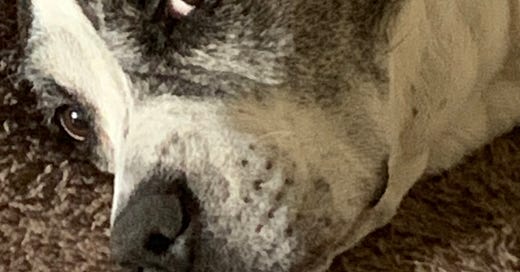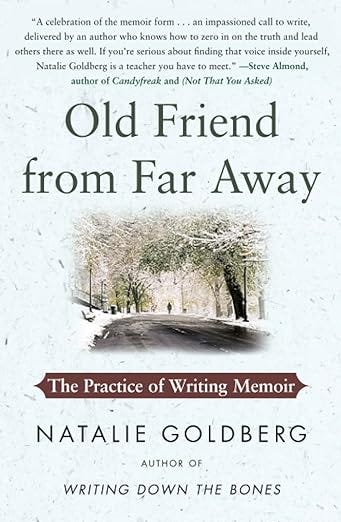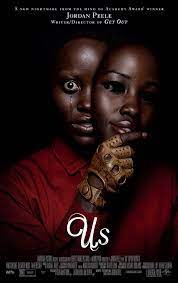Welcome to Pocketful of Prose, a community for sharing stories. This week is part five in my six-part series on the power of story. If what I write here strikes a chord with you, please click the heart at the bottom of the post. You can also support my work by becoming a paid subscriber. As always, I am including an audio recording if that works better for your life.
Without further ado, today’s pocket.
I’m writing a memoir, friends. To date, I am 55,000 plus words in. November is National Novel Writing month, a whole month dedicated to writers setting goals for their work and going after them. My goal is to finish a draft of my book this month. A memoir is 60,000 –100,000 words, so I figure I’m close.
The memoir I’m writing is about our family’s experience fostering a child and the sudden unexpected return of our foster son to his birth family. It’s about loving and learning to let go and how heartbreak, if we allow it, always opens us to something else.
As I get closer to finishing my memoir, my fears are getting a little loud. I wonder if this happens to you when you are close to something important. As some of you know, I have named my inner monster, Gloria. This week Gloria sounds a little like this. “You are a fraud. If people find out who you really are, and the things you have done, the things you allowed to happen, they would not love you, and they certainly would not want to read your book.”
Gloria is a real mean girl, but she’s got me thinking a little.
How much truth do we tell in memoir? Are some stories just ours? Are we frauds if we don’t reveal all, or does that just make us human?
As I contemplate these questions this week, I walk into my bedroom, and I kid you not, I find that Cato, my sweet anxious dog, has destroyed the draft of one of the chapters I had written about her.
Natalie Goldberg, my favorite writing guru, the teacher who I credit my entire writing practice to, says to go for the jugular when you write. “You will never get any further in writing if you censor your life. Can you imagine a memoir based on protection?
I had a good life.
It was pretty.
It was very interesting.
It was nice.
I played cards.
I swam.
I worked at my job.
I got married and had three children.
I’m going to die.
And the next line would be: Yipee! Then I can stop writing this.”
She makes a solid point. I take a strong anti-censorship stance in general. (Check out this lovely article by Jolene Handy who writes Time Travel Kitchen on a book I bet you never knew was censored.) However, while I worship at the feet of Natalie Goldberg, I have qualms with the whole jugular thing. The jugular veins are major blood vessels that direct blood from your head to your heart. If your jugular is cut, do you know what happens? —You die. You die a violent, awful death. Even going for the metaphorical jugular means to harm someone in a cruel way. Is that what I want for my writing life? I don’t think so. I think I would prefer that my jugular and the jugulars of the people I write about, especially because most of them are people I care about, remain intact.
Speaking of extreme violence, Dan and I watched Us on Halloween. Us is directed by Jordan Peele, and stars Lupita Nyong'o, who is amazing in the film. Us is about a family’s serene beach vacation going slightly awry when their doppelgängers appear and try to kill them. I consider myself a pacifist, a non-violent sort of person, and yet when I watch Jordan Peele’s films, which contain a fair share of graphic violence, I am always surprised to find myself rooting for the safety of the main characters even if it means the violent demise of other characters. I share this with Dan after the movie as we make garlic naan pizza with leftover sauce. “It’s sad,” he says. “They were all innocent. The real bad guys were the people who created the doppelgängers.” He is as right as the pizza is delicious, and it occurs to me that Jordan Peele’s film points to the common humanity in all of us. He gets us to look inward. This is something that I hope to achieve in my writing as well. I don’t want to punch down. In my memoir, I don’t want to posit myself as the hero or the villain. That’s a simplistic story, and simplistic stories, stories that suggest that we can “root for the safety and lives and rights of human beings like they are sports teams” are dangerous. (This is a quote from Rabbi Danya Ruttenberg’s Life is a Sacred Text).
I want to tell a multi-faceted story, a story that offers hope. In telling my story, the story that belongs to me and is mine alone to tell, there may be some things I choose to leave out. I get to do this because it is my story, and I am a human being who breathes, loves and has feelings, and some things cut too close to the jugular. I don’t think I have to bleed myself out to write a story that’s both authentic and valuable to others.
I got an extra dose of inspiration for this pocket from Summer Brennan who writes A Writer’s Notebook. She kicked off National Novel Writing Month by hosting Essay Camp this past week. It’s a treasure trove of pep talks, writing prompts and essays worth reading. On day one of essay camp, Summer wrote “A lot of beginning writers have been given the impression that in order to write a powerful essay, they must get very personal, and dredge up the hardest, worst, or most interesting thing that has ever happened to them and write about that. They think that their past must be strip-mined in this way, for content. But that is not really true… you do not need to go there, if you know what I mean. You can, but you don’t have to… The things you don’t write about will shine through… adding color to the things you do. Only you will know where the shine comes from.”
My light this week came from Cato. I can’t read the tea leaves for everything Cato chooses to consume. She eats a lot of non-food items. But I think I’m going to take her destruction of my draft as a sign. I will continue to follow Natalie Goldberg’s solid advice. I will give my all to the page without censor, but once that’s done, I will choose what I want to shine light on and what I would prefer stays in the dark, hidden under my bed, for only Cato to find.
As always, I would love to continue this conversation in the comments. What resonates with you? What are your thoughts about being naked on the page? Who have you read that speaks to this topic well? What movie have you seen recently that made you think?
Here’s the heart to click if this post resonated you.









Words I live by: "You own everything that happened to you. Tell your stories. If people wanted you to write warmly about them, they should have behaved better." Anne Lamott
I think that memoir is deep and true and can be heart-wrenching AND it doesn't have to include every single thing that happened to be that, just as you've expressed. There are things we can hold close to our hearts, things we don't have to share - right now or ever - and beyond that there are so many things that are unsayable, unnameable - that come through in the shadows and between the lines because that is the only way that they can come through.
As a former foster parent who hasn't written a lot about that yet myself, sending so much love and gentleness around the work you're doing. <3